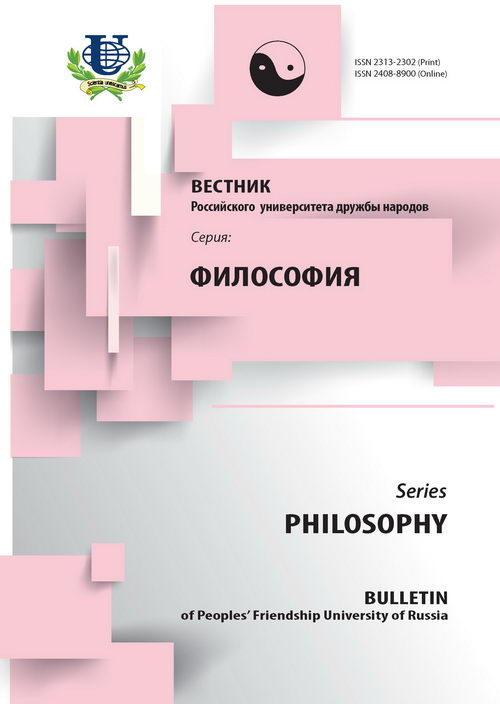No 4 (2013)
- Year: 2013
- Articles: 14
- URL: https://journals.rudn.ru/philosophy/issue/view/706
Articles
From the Editor
RUDN Journal of Philosophy. 2013;(4):5-6
 5-6
5-6


From quantum cosmology to anthropology and back
Abstract
The article demonstrates that the logical-philosophical analysis of Copernicus’ Principle and Anthropic Cosmological Principle (B. Carter) refers us to the Plato’s Cosmic Principle. The basis for their constructive critic is the appearance of the inflationary universe theory in modern quantum cosmology. This Theory allows the development of the Universe within two stages: 1) inflation and 2) evolution. It is shown that the same two-stage requirement detected in the development of an observer (the Human Being). This similarity can be fixed in the “Principle of genetic similarity” (PGS) of the observer and the Universe. PGS can be used as: 1) the criteria for demarcation of realistic and nonrealistic scenarios which are describing the Universe, 2) the basis for reconsideration of certain problems of biomedical ethics.
RUDN Journal of Philosophy. 2013;(4):7-24
 7-24
7-24


Constellations. Ritual. Existentially space
Abstract
The article is devoted to an attempt to reconstruct the elements of cosmological beliefs in societies that do not have passed the phase boundary rule philosophy. According to the presented in terms of some of the sources of cosmological ideas to be found in the history of the ritual, “the sacrifice of Heavenly Horse”.
RUDN Journal of Philosophy. 2013;(4):25-34
 25-34
25-34


 35-46
35-46


 47-50
47-50


Mysteries of spirit and science problems
Abstract
In this paper is shown that such characteristics of knowledge as the mystery and the scientific problem are different by their essence from the viewpoint of the cognitive and values consciousness’ function. The mystery is a form of spirituality, where the knowledge and experience of reality are a kind of the syncretic unity. Therefore, the mystery is uninterpreted form of the spirit in essence. I show that cognitive features dominate over the value features inside the scientific problem. So, the problem can be transformed into a finite number of available, algorithmic tasks. The problems ‘task is to introduce the subject of knowledge into the field of the unknown structural relationship of reality. A mystery brings to mind the person about the infinity of being.
RUDN Journal of Philosophy. 2013;(4):51-57
 51-57
51-57


Maginations, opinions, values and knowledge
Abstract
In article from a position of philosophy and semiotics such sign types of ideas, as imaginations, opinions, values and knowledge are analyzed. The background of features of ideas of these types includes their definition, ways of fixing in statements, the basic and maximum forms of display supporting the global and local organizations. Typology of statements derivative from the allocated types of signs. It is offered to divide statements on descriptive and estimate. The role of judgements of the named types in natural sciences, public and humanitarian disciplines, philosophies and religions is investigated. Appropriating criteria of definition of types of judgements are developed for this purpose.
RUDN Journal of Philosophy. 2013;(4):58-72
 58-72
58-72


Convergence instead of interdisciplinarity and intersubjectivity
Abstract
It is demonstrated in the paper the process of transition from the interdisciplinarity (relationships between scientific theories as logical systems) to the dialogue and intersubjectivity (relationships between creators, authors of theories) and, further, to the convergence, such type of thinking, when science builds qualitatively new technosphere, which will become an organic part of nature.
RUDN Journal of Philosophy. 2013;(4):73-80
 73-80
73-80


On a structure of humanitarian theory
Abstract
In the paper a classical model of knowledge is critically estimated. It is a foundation of construction of mathematical and natural-science theories, and a sample of designing of humanitarian scientific theories). Dependence of system organization of knowledge from kind-species ontology shows. That form of organization of knowledge is inadequate to human reality. Syntagma as model of a description of artificial human reality is discussed.
RUDN Journal of Philosophy. 2013;(4):81-94
 81-94
81-94


Knowledge and prejudice
Abstract
Subject to review in this article are the epistemological comparison parameters concepts of knowledge, truth, misconception and prejudice. The study identifies some logical consequences of this comparison. Based on the study of epistemological dimension of prejudice to establish a certain theoretical conclusions, allowing to rethink the nature and a role of prejudice as a special kind of epistemic states of consciousness.
RUDN Journal of Philosophy. 2013;(4):95-106
 95-106
95-106


Historically early forms of pedagogical activity: theory and methodology of the study
Abstract
The article studies the interaction of a teacher and a pupil as the basic pedagogical paradigm worked out during the preschool period and continuing to exist up to our time within and parallel to schooling as institution. Authors analyze features of apprenticeship in a context of various pedagogical cultures, display difficulties of knowledge of this phenomenon.
RUDN Journal of Philosophy. 2013;(4):107-114
 107-114
107-114


The state of medical cognition as a condition of biotechnologies development
Abstract
This article examines basic stages of the development of medical cognition, each of them being some type of human relation to the Nature and the corresponding way to the human being’s identification. The interrelation of a human being and environment is expressed through the health and illness conceptions which are used by the medicine to form the reality of human body and mind.
RUDN Journal of Philosophy. 2013;(4):115-125
 115-125
115-125


The problem of the relation of aesthetic and moral, beautiful and ugliness in art: from the aristocratic aestheticism to the aristocratic ugliness
Abstract
The author considers the correlation between the aesthetic and the moral from ancient to modern times. Special attention is paid to the analysis of such a phenomenon as aestheticism, manifested in art and life in England at the end of the 19 th century, in decadence in France and in D’Annunzionism in Italy. According to the author, all these phenomena were united by the cult of beauty and art. Modern (contemporary) art is characterized as aestheticizing the ugly.
RUDN Journal of Philosophy. 2013;(4):126-137
 126-137
126-137


On Our Authors
RUDN Journal of Philosophy. 2013;(4):138-139
 138-139
138-139
















